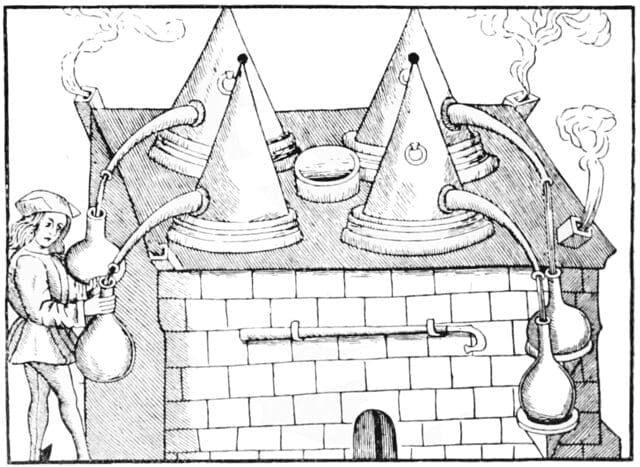Distillation is a process that has been used by humans for thousands of years to produce high-proof spirits and other alcoholic beverages. The origins of distillation are somewhat shrouded in mystery, but it is believed to have originated in either the Middle East or Asia, where the process was used to produce perfumes and medicinal remedies.
The exact date and location of the first recorded use of distillation is not known, but it is believed to have been used in the ancient civilizations of Babylon, Egypt, and Greece, where the process was used to produce a variety of medicinal remedies, including perfumes and aromatics. These early civilizations used simple stills made from clay and metal, and the process of distillation was likely performed by alchemists, apothecaries, and other skilled artisans.
The rise of the Islamic civilization in the 7th and 8th centuries saw a major expansion of the distillation process, as the Islamic Empire expanded across the Middle East and into parts of Europe. During this time, distillation was used to produce a variety of spirits and perfumes, and the process was further refined and improved by the Islamic alchemists and apothecaries.
It was not until the medieval period, however, that distillation began to be used for the production of alcohol in large quantities. In Europe, the process was first used to produce wine and beer, which were then distilled to produce stronger, higher-proof spirits. This period also saw the development of the still, which became more sophisticated and was used to produce a wider variety of spirits.
By the 15th and 16th centuries, distillation had become a major industry in Europe, with a number of distilleries producing a variety of spirits, including brandy, gin, whiskey, and other types of alcohol. During this time, distillation techniques continued to evolve, and new methods were developed for distilling, aging, and flavoring spirits.
The rise of colonialism in the 16th and 17th centuries brought distillation to the New World, where it was used to produce a variety of spirits, including rum and whiskey. In the Americas, the process was further refined and improved, and new techniques were developed for producing spirits from local ingredients, such as corn, rye, and sugarcane.
Throughout the 17th, 18th, and 19th centuries, distillation continued to evolve and expand, with new distilleries opening up all over the world, and new techniques and methods being developed for producing high-quality spirits. During this time, the process of distillation became more standardized, and new regulations were put in place to ensure the quality and safety of the spirits that were produced.
However, the rise of the temperance movement in the late 19th and early 20th centuries brought distillation to a halt, as many countries, including the United States, introduced Prohibition laws that banned the production and sale of alcohol. Despite these laws, however, the production of spirits continued underground, and the bootlegging trade became a major industry during this time.
With the repeal of Prohibition in 1933, distillation once again became a legitimate industry, and a number of distilleries reopened across the United States. During this time, the process of distillation continued to evolve, with new methods and techniques being developed for producing high-quality spirits, and new regulations being put in place to ensure the quality and safety of the products that were produced.
Today, distillation is a thriving industry, with distilleries producing a wide variety of spirits, including whiskey, gin, brandy, rum, and other types of alcohol. The process of distillation has come a long way since its origins in the ancient civilizations of Babylon, Egypt, and Greece, and the stills used today are highly sophisticated, capable of producing high-quality spirits with a range of flavors and aromas.
In recent years, there has been a resurgence of interest in artisanal and craft distilleries, which focus on producing small-batch spirits using traditional techniques and locally sourced ingredients. These distilleries are often owned and operated by passionate individuals who are dedicated to preserving the art and tradition of distillation, and producing spirits of the highest quality.
The rise of the craft distillery movement has also led to an increased interest in the history and culture of distillation, with many people exploring the origins of the process and the role it has played in different cultures and civilizations throughout history.
In conclusion, distillation is a process that has been used by humans for thousands of years, and has played an important role in the production of high-proof spirits and other alcoholic beverages. Today, the industry is thriving, with traditional distilleries producing high-quality spirits on a large scale, and artisanal and craft distilleries producing small-batch spirits using traditional techniques and locally sourced ingredients. Whether you’re a spirit lover, a historian, or just someone interested in the art and culture of distillation, there is something to be discovered and enjoyed in this fascinating industry.

